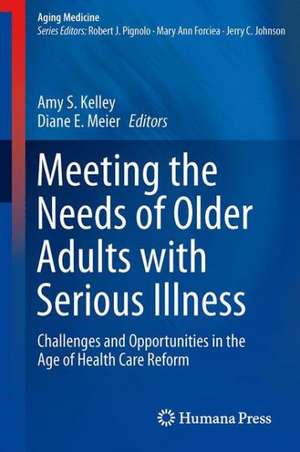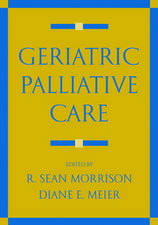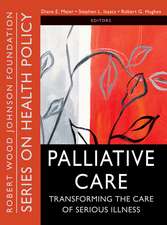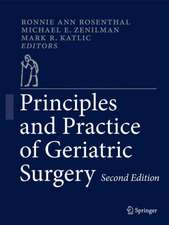Meeting the Needs of Older Adults with Serious Illness: Challenges and Opportunities in the Age of Health Care Reform: Aging Medicine
Editat de Amy S. Kelley, Diane E. Meieren Limba Engleză Paperback – 2 sep 2014
Meeting the Needs of Older Adults with Serious Illness: Challenges and Opportunities in the Age of Health Care Reform, a roadmap for effective policy and program design, brings together expertclinicians, researchers and policy leaders, who tackle key areas where real-world policy options to improve access to quality palliative care could have a substantial role in improving value.
Preț: 713.54 lei
Preț vechi: 751.10 lei
-5% Nou
Puncte Express: 1070
Preț estimativ în valută:
136.53€ • 142.94$ • 112.97£
136.53€ • 142.94$ • 112.97£
Carte tipărită la comandă
Livrare economică 05-19 aprilie
Preluare comenzi: 021 569.72.76
Specificații
ISBN-13: 9781493904068
ISBN-10: 149390406X
Pagini: 236
Ilustrații: XIII, 240 p. 17 illus., 16 illus. in color.
Dimensiuni: 155 x 235 x 12 mm
Greutate: 0.36 kg
Ediția:2014
Editura: Springer
Colecția Humana
Seria Aging Medicine
Locul publicării:New York, NY, United States
ISBN-10: 149390406X
Pagini: 236
Ilustrații: XIII, 240 p. 17 illus., 16 illus. in color.
Dimensiuni: 155 x 235 x 12 mm
Greutate: 0.36 kg
Ediția:2014
Editura: Springer
Colecția Humana
Seria Aging Medicine
Locul publicării:New York, NY, United States
Public țintă
Professional/practitionerCuprins
When More is Less: Overuse of medical services harms patients.- Disparities in Access to Palliative Care.- Family Caregiving and Palliative Care: Aligning Theory, Practice, and Policy.- This is Your Life: Achieving a Comprehensive, Person-Centered Model of Care at the Intersection of Policy, Politics, and Private Sector Innovation.- Hospice and Health Care Reform: What is the Optimal Path?.- Palliative Care in the Long Term Care Setting.- Meeting the Needs of Older Adults with Serious Illness: Challenges and Opportunities in the Age of Health Care Reform.- Palliative care’s impact on utilization and costs: Implications for health services research and policy.- Long-term Services and Supports: A Necessary Complement to Palliative Care.- The Manifest Destinies of Managed Care and Palliative Care.- Models of Care Delivery and Coordination: Palliative Care Integration within Accountable Care Organizations.- Implementing a Care Planning System: How to Fix the Most Pervasive Errors in Health Care.- Igniting Action to Integrate Palliative Care in our US Health System: The Role of Disease Specific Advocacy Groups A cancer advocacy case study.- What do you mean you don’t also offer palliative care? Effective public engagement to harness demand to improve care for serious illness.- Research Priorities in Palliative Care for Older Adults.- Medical and Nursing Education & Training.
Recenzii
From the book reviews:
“This introduction to palliative care describes current models of delivering palliative care across care settings and explores opportunities in the setting of healthcare policy reform for palliative care to improve outcomes for patients, families, and healthcare institutions. … It is a roadmap for policy and program design, and is therefore a useful resource for policymakers and healthcare administrators. … This is an excellent resource and guidebook for those looking to improve palliative care in the future.” (Darrell A. Owens, Doody’s Book Reviews, September, 2014)
“This introduction to palliative care describes current models of delivering palliative care across care settings and explores opportunities in the setting of healthcare policy reform for palliative care to improve outcomes for patients, families, and healthcare institutions. … It is a roadmap for policy and program design, and is therefore a useful resource for policymakers and healthcare administrators. … This is an excellent resource and guidebook for those looking to improve palliative care in the future.” (Darrell A. Owens, Doody’s Book Reviews, September, 2014)
Notă biografică
Amy S. Kelley, MD MSHS
Icahn School of Medicine at Mount Sinai, Brookdale Department of Geriatrics and Palliative Medicine, New York, NY, USA
Diane E. Meier, MD
Director, Center to Advance Palliative Care, Professor and Vice-chair for Public Policy, Icahn School of Medicine at Mount Sinai, Brookdale Department of Geriatrics and Palliative Medicine, New York, NY, USA
Icahn School of Medicine at Mount Sinai, Brookdale Department of Geriatrics and Palliative Medicine, New York, NY, USA
Diane E. Meier, MD
Director, Center to Advance Palliative Care, Professor and Vice-chair for Public Policy, Icahn School of Medicine at Mount Sinai, Brookdale Department of Geriatrics and Palliative Medicine, New York, NY, USA
Textul de pe ultima copertă
Meeting the Needs of Older Adults with Serious Illness: Challenges and Opportunities in the Age of Health Care Reform provides an introduction to the principles of palliative care, describes current models of delivering palliative care across care settings, and examines opportunities in the setting of healthcare policy reform for palliative care to improve outcomes for patients, families and healthcare institutions. The United States is currently facing a crisis in health care marked by unsustainable spending and quality that is poor relative to international benchmarks. Yet this is also a critical time of opportunity. Because of its focus on quality of care, the Affordable Care Act is poised to expand access to palliative care services for the sickest, most vulnerable, and therefore most costly, 5% of patients- a small group who nonetheless drive about 50% of all healthcare spending. Palliative care is specialized medical care for people with serious illnesses. It focuses on providing patients with relief from the symptoms, pain, and stress of a serious illness—whatever the diagnosis or stage of illness. The goal is to improve quality of life for both the patient and the family. Research has demonstrated palliative care’s positive impact on health care value. Patients (and family caregivers) receiving palliative care experience improved quality of life, better symptom management, lower rates of depression and anxiety, and improved survival. Because patient and family needs are met, crises are prevented, thereby directly reducing need for emergency department and hospital use and their associated costs. An epiphenomenon of better quality of care, the lower costs associated with palliative care have been observed in multiple studies.
Meeting the Needs of Older Adults with Serious Illness: Challenges and Opportunities in the Age of Health Care Reform, a roadmap for effective policy and program design, brings together expertclinicians, researchers and policy leaders, who tackle key areas where real-world policy options to improve access to quality palliative care could have a substantial role in improving value.
Meeting the Needs of Older Adults with Serious Illness: Challenges and Opportunities in the Age of Health Care Reform, a roadmap for effective policy and program design, brings together expertclinicians, researchers and policy leaders, who tackle key areas where real-world policy options to improve access to quality palliative care could have a substantial role in improving value.
Caracteristici
Identifies role of palliative care in improving quality andreducing costs across a range of health care settings and organizations Prioritizes policy changes necessary to standardize access to quality palliative care Connects new delivery and payment incentives under the ACA to opportunities for growth in palliative care services




























